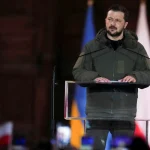Trump’s position, Smith told the court, has no grounding in the Constitution, the nation’s history or Americans’ understanding that presidents are not above the law. Even if the Supreme Court finds that former presidents are entitled to some form of immunity, Smith asserted, at least some of Trump’s actions were private conduct – far removed from “official acts” – and could be prosecuted.
“The Framers never endorsed criminal immunity for a former President, and all Presidents from the Founding to the modern era have known that after leaving office they faced potential criminal liability for official acts,” Smith told the court.
Smith’s filing landed in what has emerged as the most closely watched case of the Supreme Court’s current term. A broad ruling for Trump could undermine not only the special counsel’s election subversion case, but a litany of other criminal charges pending against him.
The Supreme Court will hear arguments April 25, and a decision is expected by July. Trump’s written reply to Smith is due next week.
Smith attempted to bat away Trump’s argument that if a limited form of immunity for former presidents exists, that would require lower courts to review how that immunity might be applied in Trump’s case. If a majority of the justices went that route, it could significantly delay a trial.
But the special counsel asserted that many of Trump’s actions were private. The Constitution, he said, doesn’t give a president a role in certifying the election of his successor. So Trump’s efforts, Smith added, were part of “a private scheme with private actors to achieve a private end: petitioner’s effort to remain in power by fraud.”
Trump filed his own initial written arguments last month, claiming that future presidents would be vulnerable to “de facto blackmail and extortion while in office” if the court denied him immunity. Past presidents, he said, could have been charged for all sorts of controversial actions they took in office.
Smith pushed back on that position in his latest brief.
“The effective functioning of the presidency does not require that a former president be immune from accountability for these alleged violations of federal criminal law,” Smith wrote Monday. “To the contrary, a bedrock principle of our constitutional order is that no person is above the law – including the president.”
In his filing last month, the presumptive 2024 GOP nominee had also floated an alternative route for the justices that would help him achieve the political goal of delaying a trial until after the November election – if they were unwilling to accept his maximalist theory of presidential immunity.
Under that scenario, the court could send the case back to lower courts for more proceedings – a move that would push off a trial for months – to determine whether any partial theory of immunity would apply in his case.
But Smith appeared eager to steer the court away from that outcome. Instead, he said that if the Supreme Court finds that former presidents are entitled to some immunity, a trial could get underway focused on Trump’s private actions.
“Even if the court were inclined to recognize some immunity for a former president’s official acts, it should remand for trial because the indictment alleges substantial private conduct in service of petitioner’s private aim,” Smith told the Supreme Court.
Trump’s “use of official power was merely an additional means of achieving a private aim – to perpetuate his term in office – that is prosecutable based on private conduct,” the special counsel argued.
Trump’s claim that former presidents must have immunity to avoid political reprisals when they leave office has been spurned by two lower federal courts. A three-judge panel of the DC Circuit unanimously rejected Trump’s position in February.
Smith also took aim at an earlier argument from Trump about whether the laws he was charged with violating applied to former presidents.
Trump “suggests that unless a criminal statute expressly names the president, the statute does not apply,” Smith said. “That radical suggestion, which would free the president from virtually all criminal law – even crimes such as bribery, murder, treason, and sedition – is unfounded.”
This story has been updated with additional details.


